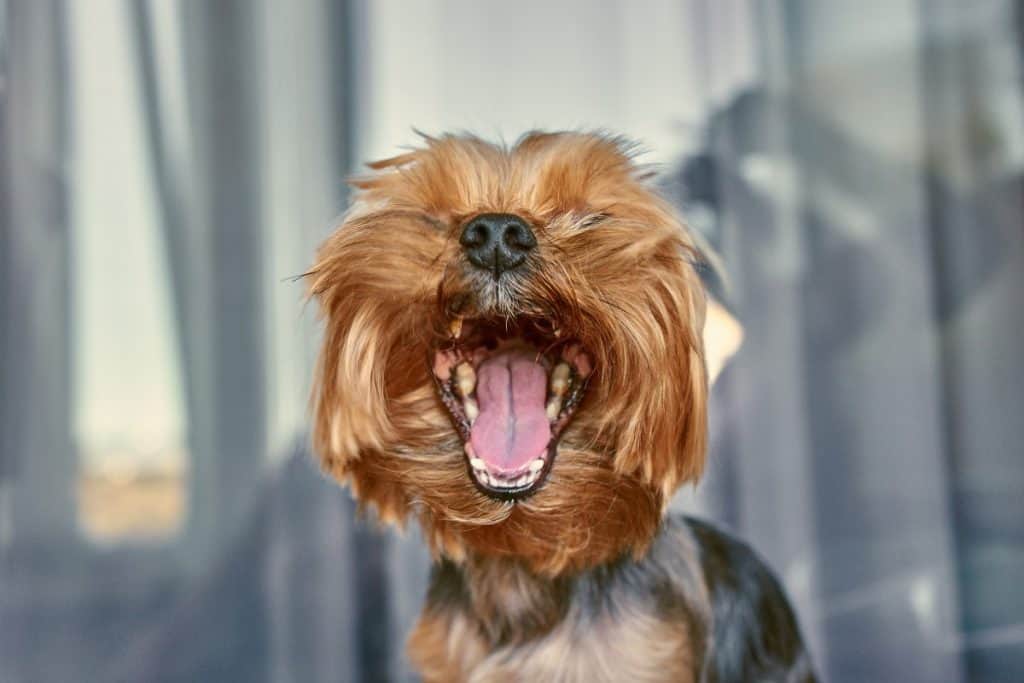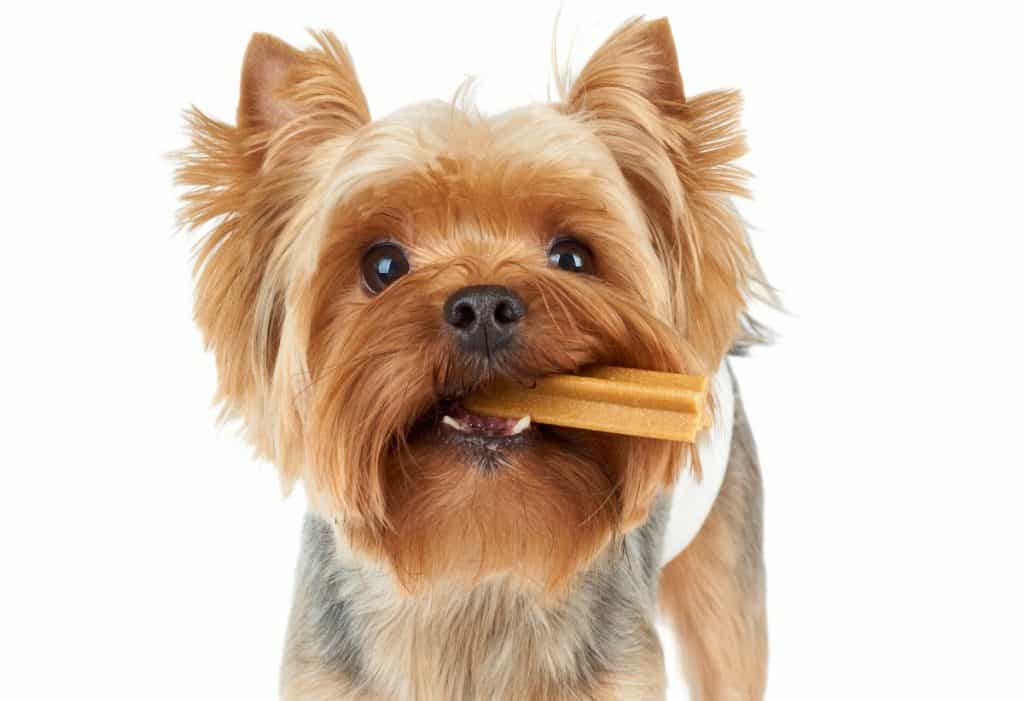Affiliate Disclosure: This post may contain affiliate links. If you make a purchase after clicking on these links I will be compensated at no extra cost to you. However, I never recommend anything I don’t love or wouldn’t use myself!
It’s safe to say that most people enjoy a good snuggle with a Yorkie, however, this experience can be somewhat tainted by the stench of bad breath as they begin to pant. I’m speaking from experience here.
Is it normal for Yorkies to have bad breath? Yorkshire terriers are fairly prone to bad breath or halitosis. As with many small dog breeds, they are more inclined to poor dental health due to their small mouth and close teeth formation.
It should be noted that there are also diseases that can cause halitosis in Yorkies so you should mention it on your next visit to the vet. I’ll cover some of these later in the article. There are also lots of home remedies and tips to help with the breath itself, read on to find out more about keeping your Yorkie smelling fresh.
Halitosis in Yorkies
If you’ve been blessed with an adorable Yorkie in your life, you may well have also been “blessed” with their stinky breath. The tight spaces between their teeth often trap food which can lead to decay and bad breath.
Although bad breath is fairly common for Yorkies, it shouldn’t be accepted as normal and forgotten about. Bad breath is usually a sign that not all is well with your dog. This is why I strongly advise you to make a vet appointment if you notice that your dog’s breath has worsened.
Tackling the route cause of your Yorkie’s bad breath is very important for the health of your four-legged friend and not only for the sake of your own nostrils.
10 Bad Breath Remedies and Tips for Yorkies
First of all, let’s get into some of the things you can do at home to improve your Yorkie’s overall oral health and hopefully improve their bad breath as a result. As I said, just be sure to help your Yorkie by pairing the following tips with a visit to the vet.
#1 Daily Teeth Brushing
This has to be first on the list as it is probably the most effective. Even though most of us know we should be doing it, many owners completely neglect to clean their dog’s teeth, others just don’t do it regularly enough.
Ideally, you should brush a Yorkie’s teeth daily for the best results. This may seem extreme but when you think about it, we brush our own teeth around twice a day and are advised to do so after every meal!
Note: If you are new to dog dental care, bear in mind that human toothpaste is toxic for dogs!
Look into a specifically formulated dog toothpaste. These come in a range of meat-based flavors that your dog should enjoy and often have natural additives such as tea tree oil which is known for promoting healthy gums. You could even try home-recipes such as baking soda (more on this later).
If you are trying a new dog toothpaste, try to ensure it is a non-foaming paste. Foam can cause discomfort to your dog and further encourage resistance to the process.
How to brush a Yorkie’s teeth:
- Use a small-headed brush and one that has soft bristles
- Apply a small amount of dog toothpaste to the brush
- Lift the lip of your Yorkie and expose the gums and teeth
- Use a gentle horizontal motion to brush their teeth and gums
- Their tongue will help to prevent the buildup of tartar and plaque on the insides of their teeth so concentrate mainly on the outsides and particularly the back molars
- Reward your dog with a fun activity or playtime, or even a dental chew
The following clip is a good visual aid and offers some great advice.
As outlined in the clip, when brushing your dog’s mouth it is also wise to familiarize yourself with is normal. This way if you observe any strange behavior, such as unusual pickiness to food, you can check inside your Yorkie’smouth and you will be able to spot abnormalities that may be causing this more easily.
#2 Dental Health Food
In general, for dogs and cats, it is recommended to use dry kibble as opposed to wet/canned foods for improved oral health. I believe this is particularly important for Yorkies who often get upset tummies and dental problems.
My Yorkie is 15 years old and her teeth have definitely seen better days. My vet recommended using a specific dry food called Hills Dental Care to help keep my Yorkie’s teeth clean.
The pieces are quite large which forces her to bite into them and the food is formulated so that this process cleans her teeth. Her teeth get cleaner as she eats, it’s genius!
I highly recommend you try this stuff which is available here on Amazon but at the time of writing this, it is much cheaper here on Chewy so I advise you to check both prices.
#3 Increase Water Intake
If your dog is dehydrated this can result in a lack of saliva production. Saliva normally cleans the mouth naturally and without it, bacteria flourishes, resulting in rotten smelling bad breath.
As the title suggests, this one is quite simple except, you can lead a Yorkie to water but you can’t make them… or can you?
One trick to get your dog to have a little extra to drink is to add a bit of vegetable or chicken stock into their water. Alternatively, you can simply add a bit of a stock cube.
Just use enough for them to enjoy the flavor but be careful not to add so much that it makes the water salty.
Also, don’t leave the stock water sitting around for too long and bear in mind that your dog should also have access to fresh clean water at all times.
#4 Brush Teeth With Baking Soda
Much of the bacteria that grows in your Yorkie’s mouth is said to thrive in slightly acidic conditions. One way to tackle this is to brush their teeth with some baking soda.
Baking soda is slightly alkaline. This will help to balance the PH level in your dog’s mouth and reduce the bacteria that are responsible for bad breath.
Method:
- Place about a teaspoon of baking soda in a small bowl or cup
- Using a toothbrush, mix in a little bit of water to create a thin paste
- Brush their teeth with the baking soda paste, mainly targeting between the teeth and the area where the teeth meet the gums
#5 Use a Green Tea Flush
Green tea is known for its antibacterial properties. Although some dogs may not love this routine, you can use green tea to flush out bacteria and food remanence after every meal.
You’ll need a plastic medicine dosing syringe and a half cup of cooled, green tea.
Method:
- Use the syringe to flush the green tea in between their teeth and gum line. (They will resist and try to move their head back which will make it difficult to maintain that aim).
- Ensure to get to their back teeth.
#6 Apple Cider Vinegar Flush
The famous home remedy for many medicinal purposes in humans is also great to help our dogs!
Apple cider vinegar is known to be antibacterial, and helpful to include in our diets. It is good for gingivitis inflammation and is recommended for its effectiveness at fighting it.
While it diluted apple cider vinegar is known to be safe for healthy dogs, check with your veterinarian before using this method regularly. The acidic treatment may not be good for some dogs with additional health issues.
Once you get the OK from your vet, the issue will be making your dog take it peacefully.
Normally you would add a teaspoon of apple cider vinegar to half a cup of water before rinsing your dog’s mouth out with the solution.
However, many of us humans are not the biggest fans of that harsh vinegar scent so you can imagine what it’s like for dogs whose sense of smell is far superior to our own.
One method to get around this is to use green to mask the smell and taste. Just add a teaspoon of apple cider vinegar to half a cup of green tea instead of water.
You can use the same approach as with the green tea flush method and apply it to the gum line of your dog’s teeth using a syringe. Then rub it into the teeth and gums to help the vinegar break into the plaque.
#7 Dental chews
A great option is to offer snacks with built-in dental benefits. Dogs love them so it’s a win-win situation. They can be used to keep their mouth clean and also as a reward for good behavior.
My favorite dental chews that I use for my dogs are Greenies (view on Amazon) and Dentastix (view on Amazon).
These are great for dental health purposes and promoted to help with bad breath as well. As always, when buying dog snacks, try to buy products that consist of natural ingredients.
#8 Apples and Carrots
Similarly to dental chews, big chunks of specific fruits and vegetables, such as apples and carrots are great for snack time too.
The act of chewing these fruits and vegetables will help to clean your dog’s teeth as well as promoting saliva production which naturally helps to combat the sources of bad breath.
#9 Chew Toys for Dental Hygiene
I understand dogs are not always the biggest fans of vegetables and that Yorkies in particular can be fussy eaters. The alternative is to provide your Yorkie with a chew toy.
Toys are important for dogs to help keep them entertained and happy. The toys themselves may not fix the bad breath nor clean their teeth. However, just like the vegetable and dental chews, chew toys will promote saliva production which will remove food particles and help with the overall bad odor.
#10 Water Treatments and Supplements
Here, I’m talking about canine-friendly water additives. Much as we can add a slice of lemon or mint to our water to freshen our breath, we can add things to our dog’s water to help them too.
Liquid supplements for canine mouth washing can be added to your dog’s water. These are supplements made to attack bacteria both in your dog’s mouth and in their water bowl.
Certain supplements are made to help with specific periodontal issues. They help attack the plaque on the surface of their teeth.
Check with your vet regarding which type of supplement might be appropriate for your Yorkie. There may be recommended supplements to target the root-cause or deepest symptom for optimal treatment.
Bear in mind that there could also be dietary restrictions that should not be paired with supplements.

Medical Issues and Common Causes for Bad Breath in Yorkies
If you are doing all that you should with regard to regular maintenance, there may be a less obvious cause behind your Yorkie’s halitosis.
Use can use the following as a rough guide to distinguish the route cause of your Yorkie’s bad breath and to help identify what the particular scent of your dog’s breath could mean.
However, before you take action, get a professional diagnosis from your vet for guidance toward the best available options for therapy and medications, if necessary.
Tooth Decay or Periodontal Disease
Type of odor: Typical bad breath/morning breath
While not all tooth-related diseases and decay have a foul-smelling odor, they are often the most common cause of bad breath.
Even if you have a daily routine of cleaning your dog’s teeth, you should not rule this out. All dogs, particularly smaller ones, are prone to dental decay which leads to periodontal disease.
Tooth Decay
Poor dental care can lead to the build-up of food particles that become trapped in the mouth.
This results in food decay and a layer of plaque that can build up on the teeth. This will quickly result in a bad odor and plaque which leads to tartar.
It may not be obvious at first sight but there may be evidence of plaque and tartar build-up when you look more closely into your Yorkie’s mouth. Sometimes it is just hidden under the gum line.
Periodontal Disease
If tartar and gingivitis (inflammation of the gums caused by bacteria) are left unchecked to fester, the next phase is periodontal disease.
Periodontal disease is an infection of the tissues that hold your dog’s teeth in place which can cause tooth loss and abscesses to form.
Periodontal infections can also spread to the sinuses and vital organs around the body which can cause eventual death.
If you suspect a tartar buildup or even just a plaque layer but you are unable to spot anything, go ahead and ask your veterinarian to look closer.
Diabetes
Type of odor: Oddly sweet or fruity
If your dog’s breath is slightly sweet-smelling with an odd fruitiness to it, this could be the result of the heightened levels of ketones in the blood. This raises the suspicion of an underlying diabetes condition.
Diabetes and its effects on the blood and blood flow can result in the symptom of bad odor but can also lead to common periodontal diseases.
The interference of blood flow to the gums is what causes the periodontal disease to manifest and this can eventually lead to halitosis.
Kidney Issues
Type of odor: Ammonia/resembling urine
If your Yorkie smells like they have been sprayed with urine (and you know they haven’t), kidney issues can be suspected.
Additionally, the pungent smell of their breath may be paired with other symptoms such as actual urine that is foul-smelling or has blood in it and kidney stones resulting in back pain.
However, these symptoms may be due to larger medical issues and will need immediate veterinarian attention.
Respiratory Issues
Type of odor: Non-specific, unpleasant
Anything involving the respiratory system could result in bad breath. This could simply be from dehydration that dries up the airway and mouth.
The smell may not be significant but watch for any raspy coughs, breaths, and any unusual wheezing, etc.
Respiratory issues can also include bacterial/viral infections or even canine asthma.
Digestive issues
Type of odor: Vomit, acidic or sour
If your Yorkie’s breath has a strange acidic odor, this could be the result of acid regurgitating up the throat, burping, or vomiting. They may also have diarrhea at the same time.
The cause of this could be any of the following:
- a reaction to something they are not used to eating
- cheap dog food or snacks with improper fillers
- a foreign object that they’ve swallowed
- an allergic reaction to incompatible food
- high-chemical food ingestion
- worm/bacterial infections
If he or she is also lethargic and is experiencing low appetite, go to the vet for a look into possible digestive issues.
Yorkies are known for their sensitive stomachs and weak digestive system and it is important to monitor what they are eating and how they react to it.
Liver Issues
Type of odor: Non-specific, Strong
Liver issues could include a common issue in Yorkies known as “liver shunt”. It may not be a significantly “odd” breath but does result in a bad stink due to improper blood flow through the liver.
Yorkshire terriers commonly develop acute liver shunts, so it is suggested to check for any other signs such as poor growth, low-energy, reoccurring UTIs, bad urine odor, dizziness, lack of appetite, or an upset stomach.
Your Yorkie’s gums could eventually have a yellow tint which will be a vital sign to have them checked by the vet right away.
Symptoms for liver shunt may not show up until Yorkies are around a year old.
Teething
Type of odor: Typical bad breath/morning breath
If your Yorkie is a little pup growing into their teething phase, it can be normal for them to have bad breath.
Often as teeth are being pushed out by newer ones, food can become trapped between them and lead to a bad smell.
If the smell goes away after he or she finishes with teething, you can be sure that it was related to teething.
Teething should end by the 7th or 8th month. If your Yorkie is suffering bad breath even after that time-frame, other underlying diseases can be suspected.
It is important to check that no other symptoms are signaling other potential issues though.
Diet (Supervised and Unsupervised)
Type of odor: Ranges from typical bad breath to poo breath
Stale kibble food is sprinkled with particles that when eaten, can result in a paste that sticks throughout the mouth and teeth. Some other foods may also result in particularly bad breath.
I’m using the term “diet” loosely here as I also mean anything that they ingest. Let’s face it, you can’t always control what your dog sneaks into their mouth.
Most dogs have some degree of “unsupervised diet.” This could be garbage bags they find their way into, decomposing animal remains, or anything they treasure-hunted from the floor, including feces from outside. All of these can undoubtedly lead to short term bad breath.
Nevertheless, in the above cases, dogs could also pick up sharp foods or objects that could easily leave open wounds in their mouths. With their curious diet, these localized wounds can easily become infected and can eventually cause an odd smell too.

Proper Dental Care for Yorkies
It may seem like your dog can’t have bad breath if you have a good routine of teeth brushing. Nevertheless, it is a good idea to look into the other tips (paste recipes and flushes) and visit the vet for a professional and thorough cleaning.
It is advised to start dental maintenance routines and habits from when your dog is young. Puppies are more likely to grow into these habits and start to enjoy them.
Proper dental care (brushing and flushing) is not just a reactive method to attack tartar but is most effective as a method for potential tooth decay and infection.
It is also recommended to visit the clinic for a dental exam or a professional clean once a year. However, the frequency will vary depending on your dog and his/her dental health situation.
What’s Involved in a Dental Exam at the Vet?
At the veterinary clinic, they will be able to provide a thorough examination of your dog’s teeth and examine their overall mouth-health.
In the meantime, here are the general steps of a dental exam, so you know what to expect:
- Examination. The vet will perform a thorough physical evaluation
- Bloodwork. Blood analysis and test result
Your vet may also need to take the following action:
- X-rays of their full-mouth
- The vet can follow with tooth scaling and polishing. These are done by ultrasonic scalers and aim to remove the plaque and tartar buildups. These are the tartars and plaques that you may or may not have been able to identify at home!
- Charting and identification of any teeth diseases
- Extractions of teeth (if necessary) – are around target injected with local anesthetics before the tooth is cut and extracted
- Polishing. This process smooths the tooth surface and removes any small scratches
- Irrigation of debris
- Monitor recovery
- Prescribe medications such as for pain relief and antibiotics
Talk to your vet to pick the right bristle size and bristle softness. They will be the best source for building your home care dental kit for your dog’s dental routine.
Tip: Most dental cleaning is performed under general anesthesia, so it is important to keep your dog healthy to reduce the risks associated with anesthesia as well as minimizing the frequency of veterinary visits.
To Conclude
Get into a good oral health maintenance routine with brushing, chews, and dental-friendly foods.
Regular visits to the veterinarian clinic for regular check-ups can help monitor your dog’s overall health and specifically periodontal health.
These visits with the combination of proper prevention and medication will help eliminate bad breath and ensure your Yorkie doesn’t have a more serious underlying condition.

